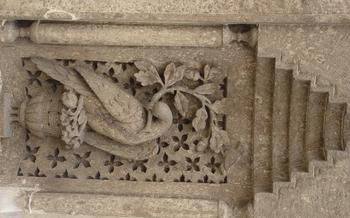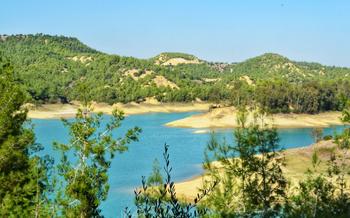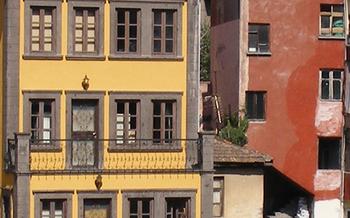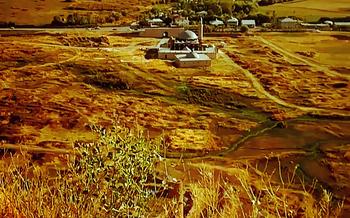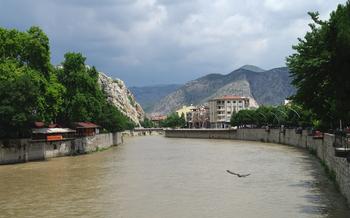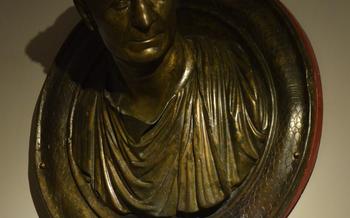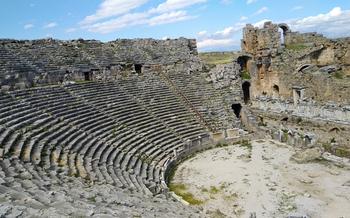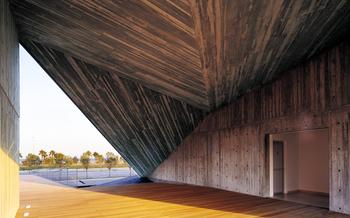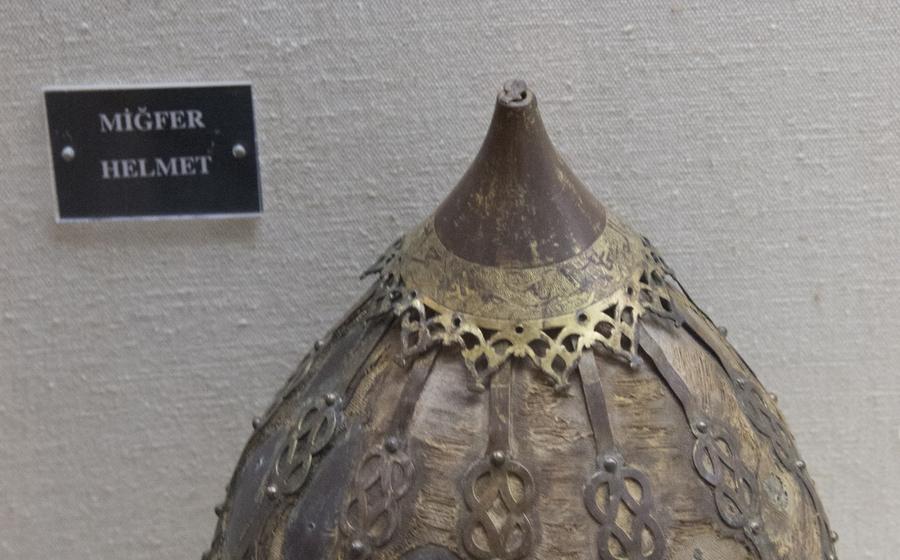
Antalya Ethnographic Museum
- A Journey Through History: Antalya Ethnographic Museum
- Navigating the Museum's Treasures
- Exploring the Roots of Nomadic Life
- A Tapestry of Textiles and Handicrafts
- Glimpsing Rural Life and Agriculture
- Honoring Local Culinary Traditions
- Preserving the Art of Traditional Crafts
- Living Spaces and Architectural Wonders
- Storytelling Through Textiles
- Capturing the Essence of Daily Life
- A Celebration of Festivals and Traditions
- Connecting with the Past Through Music and Dance
- Honoring Religious Traditions and Beliefs
- Engaging Educational Programs
- Insider Tip: Unveiling Hidden Gems and Local Secrets
A Journey Through History: Antalya Ethnographic Museum
In the heart of Antalya, Turkey, nestled amidst the city's vibrant tapestry of cultures, lies a treasure trove of history and heritage - the Antalya Ethnographic Museum. This fascinating institution invites visitors to embark on a captivating journey through time, exploring the region's rich and diverse cultural tapestry. Established in 1973, the museum occupies a beautifully restored Ottoman-era mansion, adding to its historical charm. Its collection boasts over 4,000 artifacts, meticulously curated to showcase Antalya's unique identity and traditions. Through interactive exhibits, immersive displays, and engaging educational programs, the Antalya Ethnographic Museum offers an unforgettable experience for visitors of all ages.
Step into the museum's hallowed halls, and let the echoes of the past guide you on a journey through history. Discover the stories of nomadic tribes who once roamed these lands, marvel at the intricate artistry of traditional textiles, and gain insights into the rural life and agricultural practices that have shaped Antalya's culture. The museum's collection is a testament to the region's rich culinary heritage, honoring local cuisine and culinary traditions that have been passed down through generations.
As you wander through the museum's galleries, you'll witness the remarkable skills of local artisans, showcased in exhibits dedicated to traditional crafts. From pottery and metalworking to woodworking and jewelry-making, these artisans keep alive the ancient techniques and practices that have been passed down from generation to generation. The museum also celebrates the architectural wonders of the region, showcasing the unique features of traditional houses and villages, highlighting the use of natural materials and sustainable construction methods.
The Antalya Ethnographic Museum is not just a repository of artifacts; it's a living testament to the vibrant traditions and cultural expressions of the region. Through storytelling through textiles, visitors gain insights into the role of textiles in cultural expression and identity, from traditional clothing and costumes to the rich symbolism and significance of colors, patterns, and embroidery. The museum also captures the essence of daily life, showcasing everyday objects and tools that tell stories of the routines, rituals, and traditions of local communities.
Navigating the Museum's Treasures
The Antalya Ethnographic Museum is a treasure trove of cultural artifacts and exhibits, carefully organized to provide visitors with a comprehensive journey through the region's rich history and traditions. As you enter the museum, you'll find yourself in a spacious hall that serves as the central hub. From here, various galleries branch out, each dedicated to a specific aspect of Antalya's cultural heritage.
To the right of the main entrance, you'll find the Nomadic Life section, which offers a fascinating glimpse into the lifestyle and customs of the nomadic tribes that once roamed the region. Further along, the Textiles and Handicrafts gallery showcases a stunning array of carpets, rugs, and embroideries, each piece a testament to the skill and artistry of local artisans.
To the left of the main entrance, you'll find the Rural Life and Agriculture section, which delves into the traditional farming practices and village life that have shaped Antalya's rural heritage. The Culinary Traditions gallery, located nearby, takes you on a culinary journey through the region's delectable cuisine, showcasing traditional cooking utensils, recipes, and ingredients.
As you continue your exploration, you'll encounter the Traditional Crafts section, where you can witness skilled artisans demonstrating their mastery in pottery, metalworking, woodworking, and jewelry-making. The Living Spaces and Architectural Wonders gallery provides insights into the unique features of local houses and villages, showcasing models and displays that highlight the use of natural materials and sustainable construction methods.
The museum also features a Textiles in Storytelling section, which explores the role of textiles in cultural expression through traditional clothing, costumes, and accessories. The Daily Life gallery offers a glimpse into the everyday objects and tools used by people in the region, providing insights into their daily routines, rituals, and traditions.
Finally, the Festivals and Traditions gallery celebrates the vibrant festivals and customs of Antalya, showcasing information on their history, significance, and unique customs. The Music and Dance section showcases traditional musical instruments and their significance, providing opportunities to experience the unique sounds and rhythms of the region.
Exploring the Roots of Nomadic Life
Antalya Ethnographic Museum delves into the fascinating world of nomadic tribes that once roamed the lands of Antalya. Step into their world through interactive exhibits that showcase the unique lifestyle and customs of these resilient peoples. Discover traditional tents, intricately woven with vibrant colors and patterns, providing a glimpse into their nomadic dwellings. Admire the craftsmanship of their clothing, adorned with intricate embroidery and reflecting their cultural identity. Explore the tools they used for herding, hunting, and everyday tasks, gaining insights into their ingenious adaptation to life on the move. Immerse yourself in the challenges and beauty of nomadic life, understanding its impact on the rich cultural heritage of Antalya.
A Tapestry of Textiles and Handicrafts
The Antalya Ethnographic Museum houses a captivating collection of textiles and handicrafts that showcase the region's rich artistic traditions. Visitors can marvel at the exquisite carpets, rugs, and embroideries crafted by skilled local artisans using intricate techniques and vibrant colors. Each piece tells a unique story, reflecting the cultural heritage and identity of Antalya.
Explore the museum's displays to learn about the symbolism and cultural significance of various patterns and designs. Discover the techniques used in traditional textile production, from spinning and weaving to dyeing and embroidery. Interactive exhibits and live demonstrations provide an immersive experience, allowing visitors to witness the artistry and craftsmanship firsthand.
In the Textile and Handicraft section, admire the vibrant kilims, adorned with geometric motifs and bold colors, that have become synonymous with Turkish textile art. Marvel at the intricate embroidery and delicate needlework that adorn traditional clothing, cushions, and tablecloths.
Through these exquisite textiles and handicrafts, the museum celebrates the creativity and skill of local artisans, preserving their legacy for future generations. Visitors can also support these talented craftspeople by purchasing handmade souvenirs from the museum shop, contributing to the sustainability of traditional arts in Antalya.
Glimpsing Rural Life and Agriculture
Antalya Ethnographic Museum delves into the rich agrarian heritage of the region, showcasing the traditional practices and tools that have shaped the lives of rural communities for generations. Immerse yourself in the world of farming and animal husbandry through captivating displays and interactive exhibits. Discover the ingenious techniques used for irrigation, harvesting, and cultivating the land. Witness the evolution of agricultural tools from ancient times to the present day, and gain insights into the role of sustainable practices in preserving the environment.
Explore traditional farmhouses and learn about the daily routines of farmers and their families. Discover the significance of livestock in rural life, from providing sustenance to contributing to the local economy. Interactive exhibits allow visitors to experience the challenges and rewards of farming, simulating the process of planting, tending, and harvesting crops.
Through storytelling and multimedia presentations, the museum highlights the cultural significance of agriculture in Antalya. Understand how farming traditions have influenced local customs, festivals, and cuisine. Learn about the challenges faced by rural communities, such as droughts, pests, and changing weather patterns.
Whether you have a personal connection to farming or simply want to delve into the roots of Antalya's agricultural heritage, this section of the museum offers a fascinating glimpse into a way of life that has shaped the region's history and identity.
Honoring Local Culinary Traditions
Gastronomy enthusiasts will delight in the section dedicated to traditional Turkish cuisine, a testament to Antalya's rich culinary heritage. Immerse yourself in the world of flavors as you explore displays of cooking utensils, recipes, and ingredients that have been passed down through generations. Discover the secrets behind mouthwatering dishes like "Antalya Piyazı," a refreshing bean salad, or "Şakşuka," a flavorful eggplant and tomato stew. Learn about the cultural significance of each dish and its role in shaping the region's identity. Don't miss the opportunity to savor the authentic flavors of Antalya's cuisine by visiting local restaurants that proudly showcase these culinary treasures.
Preserving the Art of Traditional Crafts
The Antalya Ethnographic Museum not only showcases the history and heritage of the region but also celebrates the skills and talents of local artisans. Dedicated exhibits highlight the intricate art of traditional crafts, offering a glimpse into the creative process and the cultural significance of various crafts.
Artisans demonstrate their skills in pottery, metalworking, woodworking, and jewelry-making, allowing visitors to witness the transformation of raw materials into beautiful objects. Interactive workshops provide a hands-on experience, enabling visitors to learn traditional techniques and create their own handmade souvenirs.
The museum's collection includes a range of handcrafted items, from intricately painted pottery and gleaming metalwork to finely carved wooden objects and delicate jewelry. Each piece showcases the skill and artistry of the craftsmen who created it, and visitors can appreciate the cultural significance and symbolism embedded in the designs.
By supporting local artisans and promoting traditional crafts, the Antalya Ethnographic Museum plays a vital role in preserving and perpetuating the cultural heritage of the region. Visitors can contribute to this effort by purchasing handmade souvenirs, supporting workshops, and spreading awareness about the importance of traditional crafts.
Living Spaces and Architectural Wonders
The Antalya Ethnographic Museum takes visitors on a journey into the architectural heritage of the region. Models and displays showcase the distinct features of traditional houses and villages, highlighting the harmonious blend of local materials and sustainable design principles. Explore the cultural significance of different architectural elements and styles, from the intricate stonework of facades to the use of natural materials like wood and mud bricks. Discover how these structures have adapted to the unique climate and lifestyle of Antalya, reflecting the region's rich cultural heritage.
Storytelling Through Textiles
At the Antalya Ethnographic Museum, textiles are not merely decorative items but powerful tools of storytelling. Traditional clothing, costumes, and accessories from different regions of Turkey adorn the exhibits, each piece holding a wealth of cultural significance. Colors, patterns, and embroidery carry symbolic meanings, narrating stories of identity, tradition, and heritage. Visitors can explore the role of textiles in religious rituals and festivals, where vibrant colors and intricate designs evoke a sense of spirituality and celebration. These exhibits offer a glimpse into the rich tapestry of cultural expression, inviting visitors to unravel the stories woven into every thread.
Capturing the Essence of Daily Life
The Antalya Ethnographic Museum offers a glimpse into the daily lives of the region's inhabitants through a captivating display of everyday objects and tools. These artifacts provide insights into the routines, rituals, and traditions of local communities. Interactive exhibits recreate scenes from daily life in the past, allowing visitors to connect with the stories of the people who used these objects. Anecdotes and stories about the individuals who once owned and utilized these items bring the exhibits to life, providing a deeper understanding of the cultural heritage of Antalya and its people.
A Celebration of Festivals and Traditions
Antalya's vibrant cultural heritage is further showcased through exhibits dedicated to the region's festivals and traditions. Immerse yourself in the history, significance, and unique customs of each celebration. Interactive displays allow visitors to experience traditional dances, music, and rituals, providing a glimpse into the rich tapestry of local life.
Don't miss the opportunity to attend local festivals during your visit to Antalya. These events offer an immersive experience of the region's cultural heritage, with colorful processions, traditional music and dance performances, and delectable local cuisine. Immerse yourself in the joyous atmosphere and connect with the warm and welcoming people of Antalya.
Local festivals are a testament to the enduring spirit of Antalya's cultural traditions. Whether it's the vibrant colors of the Pomegranate Festival, the rhythmic beats of the Zeybek dance, or the spiritual fervor of religious ceremonies, these celebrations are a vibrant expression of the region's identity. Embrace the opportunity to witness and participate in these festivals, creating lasting memories that capture the essence of Antalya's cultural heritage.
Connecting with the Past Through Music and Dance
In the heart of the Antalya Ethnographic Museum, music and dance come alive, transporting visitors to a realm where rhythm and tradition intertwine. Exhibits showcase an array of traditional musical instruments, from the haunting melodies of the bağlama to the vibrant beats of the darbuka. Live performances or recorded music fill the air with the enchanting sounds of Antalya, allowing visitors to immerse themselves in the region's rich musical heritage.
Beyond the instruments, the museum explores the profound role of music and dance in storytelling, celebrations, and everyday life. Interactive displays invite visitors to learn traditional dances, such as the energetic zeybek or the graceful halay. Workshops and performances provide a platform for visitors to experience the infectious energy of these dances and connect with the vibrant spirit of Antalya's cultural traditions.
Music and dance are not merely forms of entertainment in Antalya; they are integral to the fabric of the community. They serve as a means of expressing joy, sorrow, love, and defiance. Through these artistic expressions, the people of Antalya have preserved their cultural identity and passed down stories and traditions from generation to generation.
As you journey through the museum's exhibits, let the melodies and rhythms transport you to a time when music and dance were an inseparable part of daily life. Engage with the interactive displays, attend live performances, and immerse yourself in the vibrant tapestry of Antalya's musical and dance traditions.
Honoring Religious Traditions and Beliefs
The Antalya Ethnographic Museum not only showcases the region's cultural heritage but also pays homage to the diverse religious traditions and beliefs that have shaped Antalya's history. Exhibits in this section provide insights into the religious practices, rituals, and symbols of different faiths that have coexisted in the region for centuries.
Visitors can explore artifacts, symbols, and displays related to various religions, including Islam, Christianity, and Judaism. Interactive exhibits and multimedia presentations shed light on the history of religious tolerance and coexistence in Antalya, highlighting the region's rich cultural tapestry.
The museum also offers guided tours led by experts who provide in-depth knowledge about the religious traditions and practices of the local communities. Visitors are encouraged to ask questions and engage in respectful discussions, fostering a deeper understanding of the region's diverse religious heritage.
It is important to note that when exploring religious sites and traditions, visitors are expected to be respectful and mindful of local customs and beliefs. The museum provides guidelines and recommendations to ensure that visitors can immerse themselves in the cultural heritage of Antalya while respecting the religious sentiments of the local population.
Engaging Educational Programs
The Antalya Ethnographic Museum offers a wide range of educational programs, workshops, and seminars to engage visitors of all ages and backgrounds. These programs are designed to promote a deeper understanding of Antalya's cultural heritage and traditions.
Students, researchers, and the general public can participate in these educational initiatives. The museum collaborates with local schools and institutions to provide interactive learning experiences for students. Workshops and seminars focus on various aspects of Antalya's culture, such as traditional crafts, music, dance, and storytelling.
Visitors can inquire about upcoming programs and workshops at the museum's information desk or check the museum's website for the latest schedule. These programs offer a unique opportunity to learn from experts, engage in hands-on activities, and gain a deeper appreciation for the region's rich cultural heritage.
Insider Tip: Consider booking a guided tour that includes a visit to the museum's educational center. This can provide a more personalized and interactive learning experience, allowing you to ask questions and delve deeper into specific topics of interest.
Insider Tip: Unveiling Hidden Gems and Local Secrets
Beyond the main exhibits, the Antalya Ethnographic Museum holds a treasure trove of hidden gems and local secrets waiting to be discovered. For those seeking a deeper dive into the region's culture, I recommend exploring the lesser-known displays tucked away in the corners of the museum. These often showcase unique artifacts, traditional crafts, or personal stories that offer a glimpse into the everyday lives of Antalya's people.
Step outside the museum walls and immerse yourself in the vibrant local culture. Discover nearby traditional markets where you can haggle for handmade souvenirs, savor authentic Turkish cuisine in family-run restaurants, and engage with friendly locals who are always eager to share their stories.
One of my favorite hidden gems in Antalya is the Arapsu Bazaar, a bustling marketplace where you can find everything from colorful textiles to aromatic spices. Here, you can witness the art of traditional craftsmanship firsthand and pick up unique souvenirs that tell a story of the region's rich heritage.
Remember, the best way to experience the authentic culture of Antalya is to venture beyond the tourist trail and connect with the local community. Embrace the opportunity to learn from the locals, listen to their stories, and immerse yourself in the vibrant tapestry of Turkish life.
